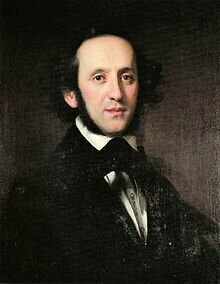
Felix Mendelssohn
Queen Victoria (1819-1901) and Prince Albert (1819-1861) were accomplished pianists and singers, and Felix Mendelssohn was their musical hero. The composer first met the Prince on 14 June 1842, hand delivering a letter from Albert’s cousin, Frederick William IV of Prussia. In turn, Mendelssohn was invited to meet the Queen the following evening. A contemporary eyewitness reports that the “royals were feeling quite nervous about meeting their musical hero, and Mendelssohn apparently felt the same way.” It was Queen Victoria who documented her first encounter with Mendelssohn as she writes in her journal, “After dinner came Mendelssohn, whose acquaintance I was so anxious to make… He is short, dark, and Jewish looking, delicate, with a fine intellectual forehead. I should say he must be about 35 or 36. He is very pleasing and modest… He played first of all some of his “Lieder ohne Worte.”
Felix Mendelssohn: Lieder ohne Worte, Book 2, Op. 30 – No. 10 in B Minor, Op. 30, No. 4, MWV U98 (András Schiff, piano)
Felix Mendelssohn: Lieder ohne Worte, Book 2, Op. 30 – No. 12 in F-Sharp Minor, Op. 30, No. 6, MWV U110, “Venezianisches Gondellied” (András Schiff, piano)
Felix Mendelssohn: Lieder ohne Worte, Book 1, Op. 19b – No. 1 in E Major, Op. 19b, No. 1, MWV U86 (András Schiff, piano)
Felix Mendelssohn: Lieder ohne Worte, Book 1, Op. 19b – No. 2 in A Minor, Op. 19b, No. 2, MWV U80 (András Schiff, piano)
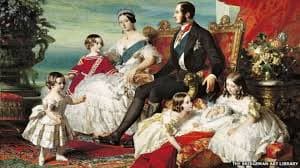
Queen Victoria and Prince Albert 1846
As was customary, Mendelssohn asked the royal couple to give him a theme on which he could improvise. The Queen reports, “We gave him two, “Rule Britannia” and the “Austrian National Anthem”. He began immediately and really I have never heard anything so beautiful, the way in which he blended them both together and changed over from one to the other, was quite wonderful as well as the exquisite harmony and feeling he puts into the variations, and the powerful rich chords, and modulations, which reminded me of all his beautiful compositions. At one moment he played the Austrian National Anthem with the right hand, he played “Rule Britannia” as the bass, with his left! We were all filled with the greatest admiration. Poor Mendelssohn was quite exhausted when he had done playing.” Realizing how much Victoria and Albert enjoyed playing piano duets, Mendelssohn presented the royal couple with a special arrangement of his “Scottish” symphony.
Felix Mendelssohn: Symphony No. 3 in A minor, Op. 56 “Scottish” (version for piano duet) – I. Andante con moto – Allegro un poco agitatio – Assai animato – Andante come prima (Goldstone and Clemmow)

Queen Victoria
Just a couple of months later, Felix Mendelssohn was back at Buckingham Palace. And it is quite clear that they all had become good friends by then. Mendelssohn reports, “… I begged the Prince to begin playing me something, so that I could boast of it in Germany. He played a chorale by heart, with the pedals – and so charmingly, precisely and accurately that it would have done credit to a professional… Then it was my turn, and I began with the chorus from St. Paul, “How lovely are the messengers.” Before I had come to the end of the first verse they both began singing the chorus, and Prince Albert managed the stops so cleverly for me that I was quite enchanted…The Duchess of Kent came in, and while they were all talking I rummaged about among the music on the piano and soon discovered my first set of songs; so of course I asked the Queen to sing one of these, and she agreed. And she sang “Schöner und schöner schmückt sich” – and sang it quite charmingly, strictly in time and in tune, and very nicely enunciated. Only when it came to the line “Der Prosa Last und Müh,” where it goes down to D and then rises again chromatically, each time she sang D sharp. But except for this little mistake it was really charming, and I’ve never heard an amateur sing the last sustained G better, more purely or more naturally.”
Fanny Mendelssohn: Italien (Schöner und schöner schmückt sich der Plan) (Christina Högman, soprano; Roland Pöntinen, piano)
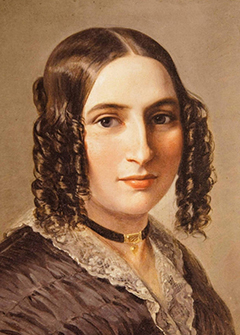
Fanny Mendelssohn
Of course, Felix’s sister Fanny had actually composed the setting of “Italien” to a text by Grillparzer. Felix was convinced that “publishing her music would only disturb her in her primary duties of managing her house,” Felix went ahead and issued a number of his sister’s settings under his name. However, he did eventually inform Queen Victoria.
“Then I had to confess – I found it very hard, but pride goeth before a fall – that Fanny had written that song, and would she now sing one of mine? She said she would gladly try, so long as I gave her plenty of help, and then she sang “Lass dich nur nichts dauern” really quite faultlessly and with much feeling and expression. I thought that this wasn’t the moment to indulge in extravagant compliments, so I merely thanked her several times. But when she said ‘Oh, if only I hadn’t been so frightened! I generally have a pretty long breath,’ then – and with the clearest conscience – I praised her warmly, because it was precisely that particular passage at the close, with the long-sustained C,
that she had managed so well…”
Felix Mendelssohn: Pilgrim’s Song “Laß dich nur nichts nicht dauern,” 12 Lieder, Op. 8, No. 5 (Benjamin Appl, bass; Malcolm Martineau, piano)
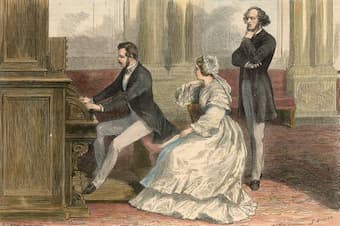
Prince Albert, Queen Victoria and Mendelssohn
Visiting royalty can be a somewhat nervous affair, and even the seasoned Felix Mendelssohn was worried about his nerves when performing for Queen Victoria and Prince Albert. He writes in his diary, “Usually when I particularly want to improvise well I do it badly – and that would have spoilt my whole morning. But it was as if everything conspired to make it perfect, for I never improvised better…I played for a long time, and enjoyed it so much myself … The Queen said several times, I hope you will come back to England again soon and pay us another visit.” Queen Victoria noted in her diary on 9 July 1842, “Mendelssohn was good enough to play for us on Albert’s organ, which he did beautifully…We thanked him very much and I gave him a handsome ring as a remembrance.” Mendelssohn returned to England roughly 2 years later and he was once again guest at Buckingham Palace.
Felix Mendelssohn: A Midsummer Night’s Dream “Overture,” Op. 21
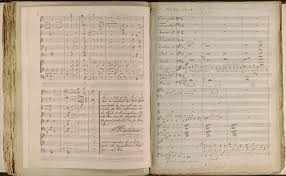
Score to Elijah
The Queen writes in June 1844, “Mendelssohn is such an agreeable, clever man and his countenance beams with intelligence and genius.” And when he directed a Philharmonic concert on 10 June 1844, the royal couple sat just “ten steps away from Felix.” Mendelssohn returned to England in 1847 to conduct performances of his oratorio “Elijah” at Exeter Hall. Queen Victoria and Prince Albert attended the second performance, and afterwards the Prince sent Felix his own copy of his program with the following inscription written in German. “To the noble artist who, surrounded by the Baal-worship of debased art, has been able, by his genius and science, to preserve faithfully, like another Elijah, the worship of true art, and once more to accustom our ear, amid the whirl of empty, frivolous sounds, to the pure tones of sympathetic feeling and legitimate harmony: to the Great Master, who makes us conscious of the unity of his conception, through the whole maze of his creation, from the soft whispering to the mighty raging of the elements. Inscribed in grateful remembrance by Albert. Buckingham Palace, 24 April 1847.”
Felix Mendelssohn: Elijah, Op. 70 (Thomas Allen, baritone; Anthony Rolfe-Johnson, tenor; Anne Sofie von Otter, contralto; Yvonne Kenny, soprano; Academy of St. Martin in the Fields Chorus; Neville Marriner, cond.; Academy of St. Martin in the Fields Orchestra)
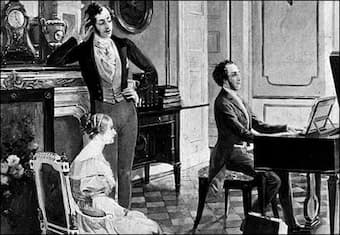
Albert and Victoria listening to Mendelssohn
On 1 May 1847 Mendelssohn made his last visit to Buckingham Palace. Queen Victoria recalled, “We had the great treat of hearing Mendelssohn play, and he stayed an hour with us, playing some new compositions, with that indescribably beautiful touch of his. I also sang 3 of his songs, which seemed to please him. He is so amiable and clever. For some time he has been engaged in composing an Opera and an Oratorio but has lost courage about them. The subject for his Opera is a Rhine Legend, and that for the Oratorio, a very beautiful one, depicting Earth, Hell and Heaven, and he played one of the Choruses out of this to us, which was very fine.” Mendelssohn saw Prince Albert for the last time on 5 May 1847 at a Concert of Ancient Music organized by the Prince at the Hanover Square Rooms. Mendelssohn performed an organ prelude and fugue by Bach, and he presented the Prince with an additional special piano duet arrangement of his “Lieder ohne Wrote”.
Felix Mendelssohn: Lieder ohne Worte, Book 5, Op. 62 (piano duet) (Silver Garburg Piano Duo)
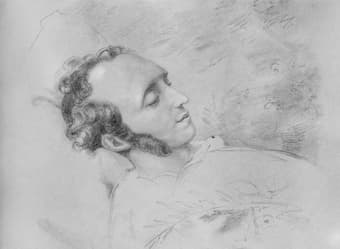
Mendelssohn on his deathbed
When Mendelssohn died on 4 November 1847 at age 38, Queen Victoria recorded her personal grief in her diary upon learning the news of his death. “We were horrified, astounded and distressed to read in the papers of the death of Mendelssohn, the greatest musical genius since Mozart, and the most amiable man. He was quite worshipped by those who knew him intimately, and we have so much appreciated and admired his wonderfully beautiful compositions. We liked and esteemed the excellent man, and looked up to and revered, the wonderful genius, and the great mind, which I fear were too much for the frail delicate body. With it all he was so modest and simple…” And three days later she added, “We read and played that beautiful “Lied ohne Worte,” which poor Mendelssohn arranged and wrote out himself for us this year. To feel, when one is playing his beautiful music, that he is no more, seems incomprehensible!” Later in life Queen Victoria would proudly proclaim, “Felix Mendelssohn had been her singing teacher!
For more of the best in classical music, sign up to our E-Newsletter
Felix Mendelssohn: 6 Gesänge, “Auf Fluegeln des Gesanges” Op. 34, No. 2 (Jonas Kaufmann, tenor; Helmut Deutsch, piano)




